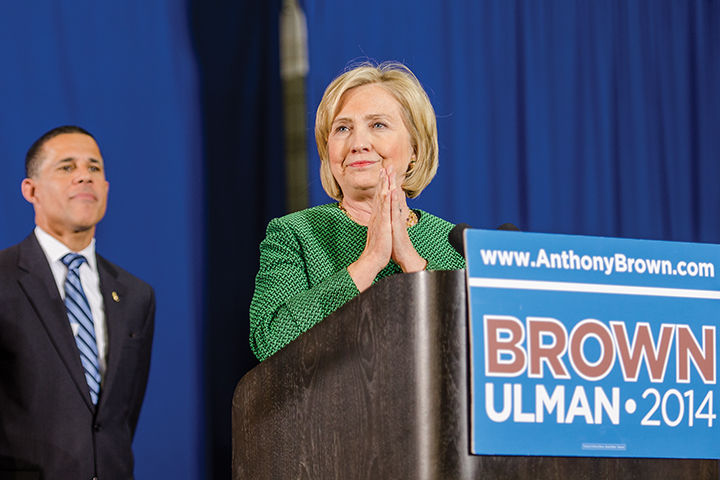As the end of Gov. Martin O’Malley’s eight-year tenure approaches, state lawmakers are reflecting on his achievements and speculating about his possible presidential aspirations for 2016.
When O’Malley took office in January 2007, he was a 44-year-old with an ambitious progressive agenda who had spent eight years as mayor of Baltimore helping the city reduce violent crime.
But when faced with a global financial crisis that raised unemployment, reduced state revenues and forced many states to make significant cutbacks in areas such as education, he responded by instituting a tuition freeze that kept college costs from rising for the next four years.
“His support for higher education and his support for college affordability reflects his values,” Sen. Jim Rosapepe (D-Prince George’s) said. “He basically just gets it that higher quality education at affordable prices is critical to reducing inequality in the country and to improving everyone’s standard of living.”
Since 2010, O’Malley has capped tuition increases at 3 percent per year. Between 2008 and 2013, this state’s tuition and fee increases at four-year institutions were the second lowest in the country, according to College Board.
“It’s hard to look at O’Malley’s record on higher education and say it was anything but good,” Student Government Association President Patrick Ronk said. “From a student’s perspective, we’ve been so happy to work with Governor O’Malley because he’s been so amenable to everything we’ve really asked for and everything we think students have needed.”
Del. Jolene Ivey (D-Prince George’s) said she prioritizes college affordability because of the direct impact it has on her family. She has five sons, three of whom are in college. She said she hopes another son — a high school senior — attends this university for its low cost.
“I have gotten a very up-close look at how these decisions are made,” said Ivey, who has been on the Ways and Means Committee and education subcommittee. “I am 100 percent sure that the tuition would not be what it is today without Gov. O’Malley.”
O’Malley also presided over a number of social reforms, which he has touted on several trips around the country this fall while weighing a presidential bid.
In May 2011, O’Malley signed the DREAM Act, which allows children of undocumented immigrants to receive in-state tuition. Voters approved the measure in a 2012 referendum.
In March 2012, he signed a law permitting same-sex marriage, which 52.4 percent of voters approved in a referendum that November, making this state the first to do so.
“He’s focused on promoting the dignity of all Marylanders,” said Stephen Neuman, O’Malley’s public affairs director. “That’s why he passed marriage equality and successfully defended it at the ballot box. … Together with all Marylanders, we passed the DREAM Act to provide opportunities to Maryland students notwithstanding their immigration status.”
O’Malley also signed a law in May 2013, which repealed the state’s death penalty, making this state the 18th state to abolish capital punishment.
“He will be remembered for being at the forefront of repealing the death penalty,” Del. Joe Vallario (D-Calvert and Prince George’s) said. “The bill had been around for years, but it had never moved until it got backing from the governor. Once he came aboard, it finally got passed.”
This past legislative session, O’Malley signed laws decriminalizing the possession of small amounts of marijuana and increasing this state’s hourly minimum wage to $10.10 by 2018.
He has also instituted a number of environmental regulations, setting a plan in November for the state to achieve an 80 percent greenhouse gas reduction by 2050.
“The governor presided over eight years of progressive change, economic improvement and toughening environmental enforcement,” Sen. Jamie Raskin (D-Montgomery) said. “He can rightfully lay claim to a progressive legacy in the history of our state.”
But some Republicans criticized O’Malley’s record on tax increases and budget shortfalls, which some said led the state to elect a Republican governor, Larry Hogan, on Nov. 4.
“He increased the budget every single year in office and he stood there and told the people of Maryland he was not doing that,” Del. Michael Smigiel (R-District 36) said. “Now we’re seeing the results of just how far in the hole we are and how long it’s going to take us to recover from what he’s done. He’s chased the businesses away, chased the citizens away, because of overtaxation.”
Although O’Malley has expressed presidential aspirations, he has made no official announcements to pose a challenge to likely Democratic frontrunner Hillary Clinton.
“He has a strong record to present to progressives across the country,” Raskin said. “If there’s no other viable progressive candidate and O’Malley can establish himself in that way, I think he has a shot.”
Raskin noted O’Malley was a strong supporter of Clinton during her 2008 campaign, and said he could be eyeing a spot in her cabinet if the former secretary of state secures the nomination. He suggested O’Malley would be ripe for a position as attorney general or in the Housing and Urban Development, Homeland Security or Transportation departments.
Neumann, one of O’Malley’s top advisors, declined to comment on the governor’s presidential aspirations. But he said O’Malley is “focused on using his remaining time in office to continue to make progress on the strategic goals that he has set out to move Maryland forward.”
O’Malley’s political action committee, O’Say Can You See, reported about $938,000 on hand as of Dec. 4. The PAC contributed to several Democratic campaigns before the Nov. 4 election, and O’Malley traveled across the country to lend support to Democrats in close races.
A spokeswoman for O’Malley’s PAC, Megan Adams, said O’Malley wouldn’t think about a presidential run until after his term as governor ends, but she said his progressive issues record could appeal to voters across the country.
Rosapepe said O’Malley’s commitment to higher education could resonate with voters nationwide if he launches a campaign.
“People all over the country will be attracted to that. It’s not just college-aged folks; it’s parents and their families,” Rosapepe said. “College affordability is a priority that most Americans share that they easily understand and they will see that he is committed to it and he has delivered on it.”
Governor Martin O’Malley takes a “group selfie” with the attendants of the Anthony Brown rally event at the McKeldin Mall on Saturday, October 25.
Hillary Clinton speaks during the Brown/Ulman rally at Richie Colosseum in College Park, Maryland on Thursday, October 30 2014





